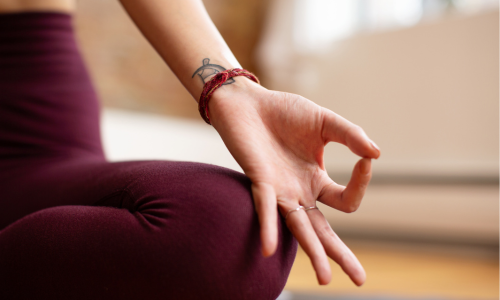How to Approach Exercise with Bulimia: Finding Balance and Healing
Nov 01, 2023
Are you ready to talk about exercise in the context of Bulimia, and how it can be both a challenge and a source of healing?
Excessive Exercise and Its Link to Bulimia
Let's begin by exploring the connection between excessive exercise and Bulimia. Excessive exercise can manifest as a compulsive and even compensatory behavior in individuals dealing with Bulimia and the Bulimia Non-Purge Subtype. It often becomes a way to cope with emotional distress or an attempt to "offset" or "compensate" for calories consumed during binge eating episodes.
In some cases, it can also serve as a sabotaging behavior, triggering more overt eating disorder behaviors. Compulsive exercise is often one of the behaviors individuals with eating disorders justify, believing that it helps them maintain control. As one of my mentors, Carolyn Costin, aptly puts it, "Give a person with an eating disorder ANYTHING, and they will figure out how to abuse themselves with it." This highlights the adaptability of individuals with eating disorders in finding ways to perpetuate their unhealthy behaviors, even if it means turning something as positive as exercise into a source of harm.
However, it's essential to remember that too much of a good thing is no longer a good thing, even when it comes to exercise. There are three significant concerns to address:
-
Your Body Needs Time to Rest
Overexercising without allowing your body to recover can lead to physical and emotional burnout. Rest is essential for muscle recovery, energy replenishment, and overall well-being.
- The Complications of Combining Food Restriction, Purging, and Excessive Exercise
When exercise is intertwined with disordered eating patterns, it can lead to severe health consequences. The combination of restricting food intake, engaging in purging behaviors, and overexercising can result in nutritional deficiencies, electrolyte imbalances, and long-term damage to vital organs.
- Exercise as a Source of Punishment or Coping
For some individuals with Bulimia, exercise can become a form of self-punishment for perceived dietary "transgressions" or a way to numb emotional pain. This transformation of exercise into a punitive or coping behavior can further entrench unhealthy relationships with one’s body and food.
Exercise Resistance: The Other Extreme
Now, let's explore the other extreme: exercise resistance. This is the category I once found myself in while I struggled with Bulimia, and if you're in the same boat, you might even wish you had an exercise addiction instead. To be completely honest, I once despised exercise with great passion, yet believed if I could overcome my resistance and be consistent, I would have the body I wanted and no longer feel an urge to purge. Thinking this would help heal my eating disorder.
I'd go through periods of trying to establish a routine, sometimes even hiring trainers, only to fall out of the routine within weeks because I dreaded going to the gym. This made me feel terrible about myself, as I felt I was "failing" at yet another aspect of my life.
I even had two significant, romantic relationships while struggling with my eating disorder, where the men were genuine bodybuilders, and one even competed. I can admit two things to you now that I would have never dared to say back then. I entered those relationships because they made me FEEL small compared to them, and I thought that their discipline with working out might rub off on me. Those were not very healthy relationships, driven by my desire for external validation and false beliefs about how exercise could magically transform me.
The major problem with exercise resistance is that our bodies are designed to move, and movement can help improve our body image and emotional well-being. Yet, the mental barriers to exercise can be formidable. Here are some things I used to say and that my clients struggling with exercise resistance also relate to:
- "I have no time to work out."
- "I don't have the energy."
- "I never see any changes to my body, so what's the point."
- "I am no good at things like running."
- "I can never follow a workout plan."
- "I do well for a while, but as soon as I take a break, I just stop completely."
- "I hate the gym."

Finding Your Love for Movement in Bulimia Recovery
Excessive Exercise: Recognizing and Rebalancing
If you find yourself in the camp of excessive exercise, it's essential to reflect on the problems your relationship with exercise creates. Consider the following journal prompt:
- Journal Prompt: What problems does your relationship with exercise create?
Be honest with yourself and take time to identify the negative consequences. Once you've recognized these issues, it's time to set a specific goal for change.
- Goal Setting: What is one way you can commit to decreasing your exercise?
Be specific about the reduction you aim to achieve. Additionally, consider what you will do INSTEAD of exercising. For instance, you might decide, "I will decrease working out to four days per week, with 30-minute durations. On my days off, or when I feel anxious, I will dedicate at least 30 minutes to meditation."
Exercise Resistance: Overcoming Barriers
On the other hand, if exercise resistance is more familiar to you, it's crucial to consider how you can overcome your reluctance to engage in physical activity. Here's a journal prompt to guide your reflection:
- Journal Prompt: If all exercise burned the same number of calories, what would you do?
Imagine a scenario where exercise isn't tied to calorie burn, and consider what types of activities you'd be more inclined to participate in. Now, set a flexible goal that allows for adaptability.
- Goal Setting: What's your number one hurdle around exercise, and how can you overcome it?
Set a goal that promotes flexibility in your exercise routine to make it more manageable. For example, your goal might be, "I will leave work by 5 pm four days a week, creating time to attend a Zumba class before dinner and evening routines. If I can't leave work as planned on a specific day, then the following morning, I will wake up early and take a walk before starting my day."
Embracing Non-Judgment
Before you embark on your journey to find your love for movement, it's important to address one more significant factor - judgment. Many times, what holds us back from having a balanced relationship with exercise is self-criticism and judgment.
Just as with food, you may have labeled some exercises as "good" and others as "not even exercise." This labeling can hinder your progress in Bulimia recovery. Remember, just as all foods can fit in your diet, as long as there isn't a medical need to exclude them, the same holds true with exercise. Every form of movement has its unique benefits, and for individuals with eating disorders, practices like yoga and mindful walks in nature have profound healing abilities. These activities can support physical, mental, and emotional well-being.
The relationship between Bulimia and exercise is a complex.
One filled with challenges and opportunities for healing. It's crucial to remember that the power to transform your life and conquer Bulimia lies within you, and your journey toward recovery is possible. Whether you've struggled with excessive exercise or exercise resistance, you have the capacity to find balance and embrace exercise as a source of healing and empowerment. You are not alone in this battle, and by seeking support from professionals, friends, and communities dedicated to recovery, you can draw strength from those who understand your struggles and have paved the way to transformation.
Remember that your body is a remarkable instrument of resilience and change, and it deserves to be treated with kindness and respect. As you embark on the recovery journey, take small steps, be patient with yourself and celebrate every achievement, no matter how modest it may seem. Let your desire for a better, healthier, and more fulfilling life ignite the spark of change within you. Embrace the idea that you deserve to experience freedom from the grips of Bulimia and the distress it brings. The path to recovery may be challenging, but it is entirely achievable.
Now, as you reflect on the insights shared here, take that first step, no matter how small, toward a healthier relationship with exercise and, ultimately, a life free from the clutches of Bulimia. Your transformation begins with a single choice and a commitment to your well-being. Embrace that power, and let it propel you toward the life you deserve—one filled with health, happiness, and a love for yourself. Your journey to conquering Bulimia is waiting to be written, and it begins with the pen in your hand.
With Love & Light,
Sarah Lee is a Certified Eating Disorder Recovery Coach with four professional certifications, including one from the esteemed Carolyn Costin Institute. Since 2016, she has run a private practice currently located in Dallas, TX, assisting clients globally along with mentoring newer recovery coaches.
Posted on November 1st, 2023.
Struggling with Bulimia? Claim your complimentary offer now! Dive into a 25-minute video presentation outlining our most effective strategies for addressing purging behaviors. Click Here.
Conquering Bulimia-Online Bulimia Recovery Course



